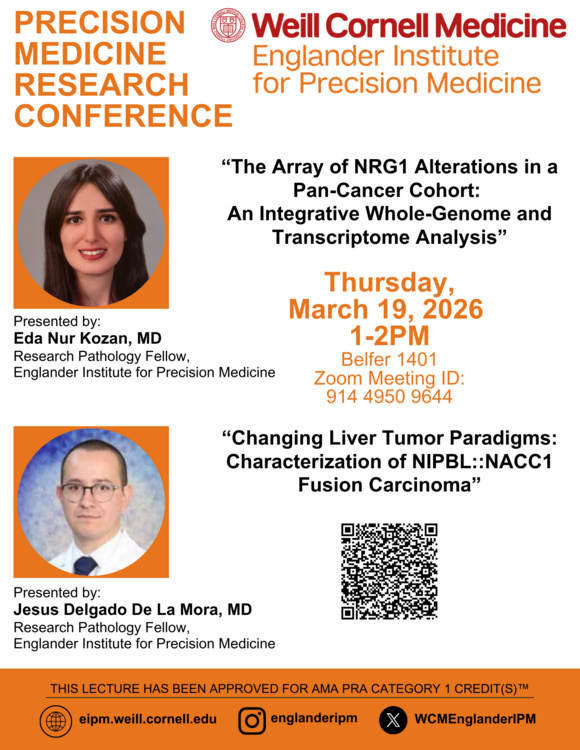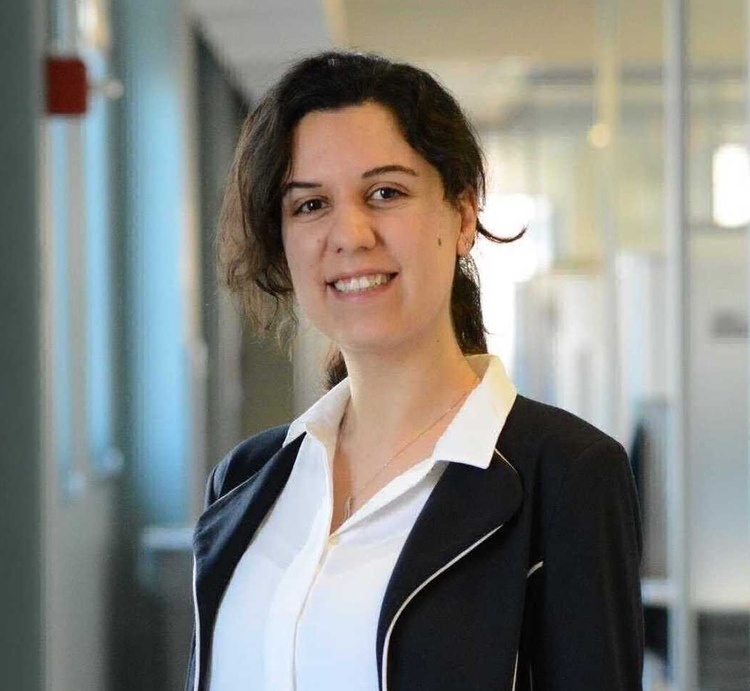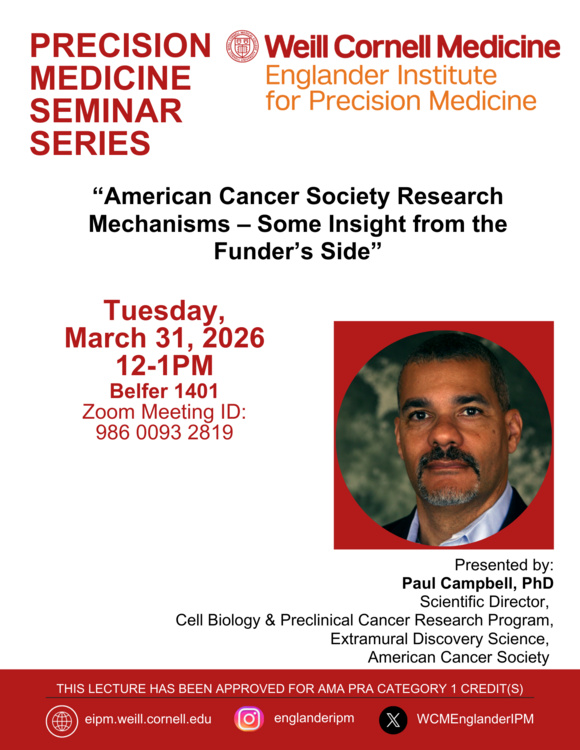Apr
10
2:00pm - 3:00pm
Belfer Research Building
EIPM Precision Medicine Research Conference with Majd Al Assaad, MD
Cases referred by Clara Hwang, MD of Henry Ford Health
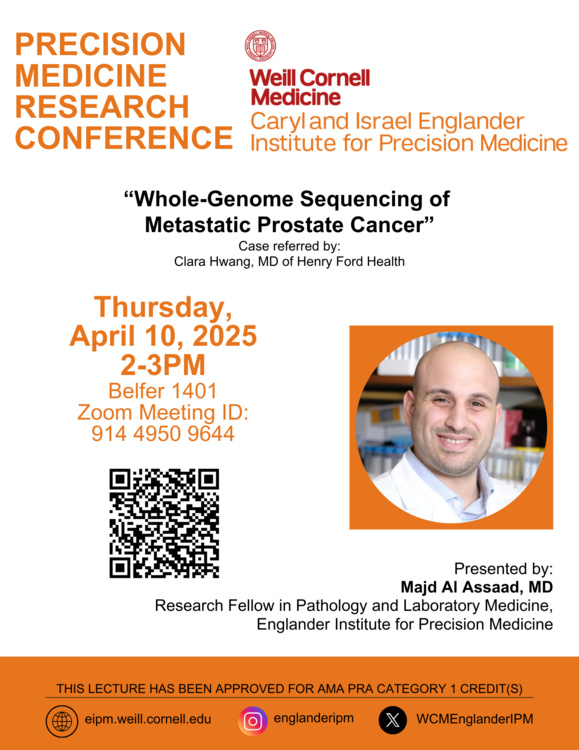
Apr
03
12:00pm - 1:00pm
Belfer Research Building
EIPM Precision Medicine Seminar Series with Dr. Ansuman Satpathy
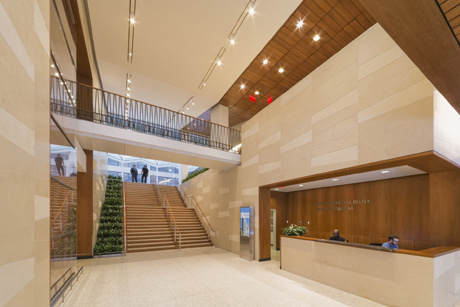
Mar
27
3:00pm - 4:00pm
Belfer Research Building
Englander Institute for Precision Medicine Journal Club
RNA neoantigen vaccines prime long-lived CD8+ T cells in pancreatic cancer
Published February 19, 2025
Nature
Presented by:
Francis J May, MD
Medical Genetics Fellow
Memorial Sloan Kettering Cancer Center / NYP-Weill Cornell
Thursday, March 27, 2025
3:00 – 4:00 PM ET
Belfer Research Building, Room 1401
https://weillcornell.zoom.us/j/92600608747
Zoom Meeting ID: 926 0060 8747
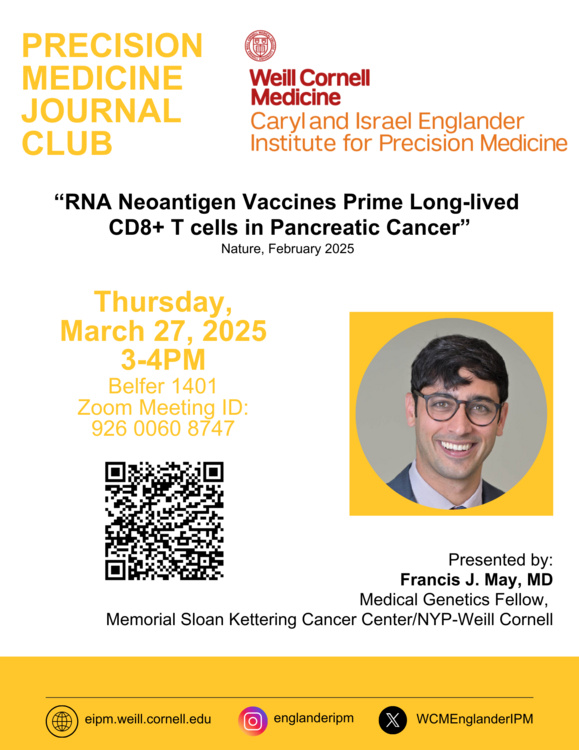
Mar
27
3:00pm - 4:00pm
Belfer Research Building
Presented by Francis May, MD
Thursday, March 27, 2025
3:00 – 4:00 PM ET
Belfer Research Building, Room 1401
https://weillcornell.zoom.us/j/92600608747
Zoom Meeting ID: 926 0060 8747
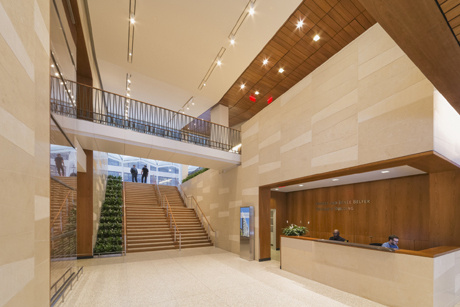
Mar
27
12:00pm - 1:00pm
Belfer Research Building
EIPM Precision Medicine Seminar Series with Dr. Paul Mischel
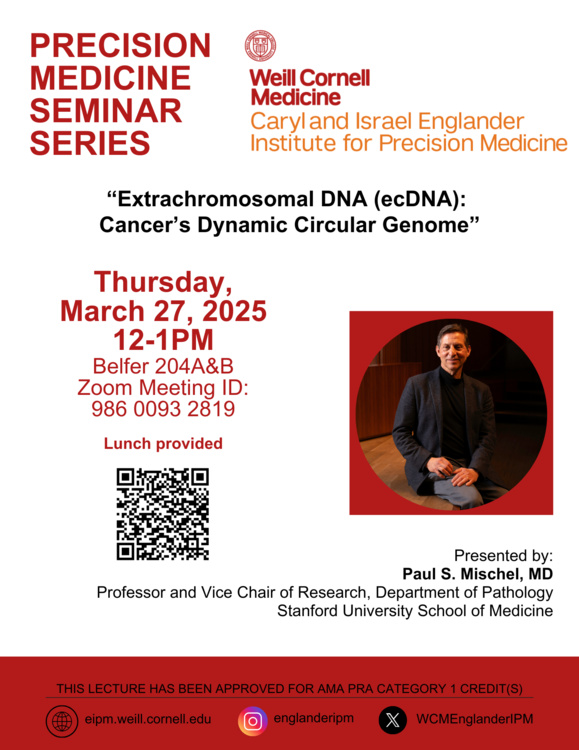
Mar
21
11:00am - 12:00pm
Weill Greenberg Center
EIPM Precision Medicine AI Working Group with Chengqi Xu

Mar
21
11:00am - 12:00pm
Weill Greenberg Center
EIPM Precision Medicine AI Working Group with Chengqi Xu
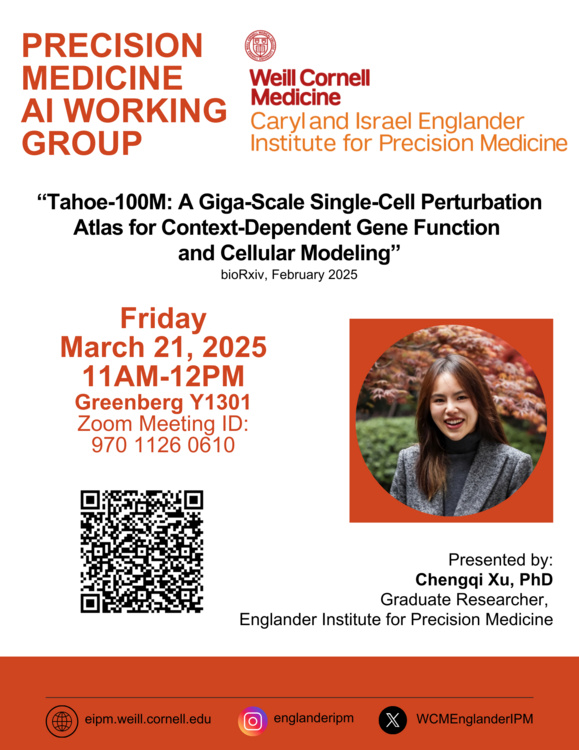
Feb
27
3:00pm - 4:00pm
Belfer Research Building
Englander Institute for Precision Medicine Journal Club
with snacks!
Hypoxia Coordinates the Spatial Landscape of Myeloid Cells within Glioblastoma to Affect Survival
Published May 17, 2024
Science Advances
Presented by Amanda Reid, BS, Translational Research Technologist II
Thursday, February 27, 2025
3:00 – 4:00 PM ET
Belfer Research Building, Room 1401
https://weillcornell.zoom.us/j/92600608747
Zoom Meeting ID: 926 0060 8747
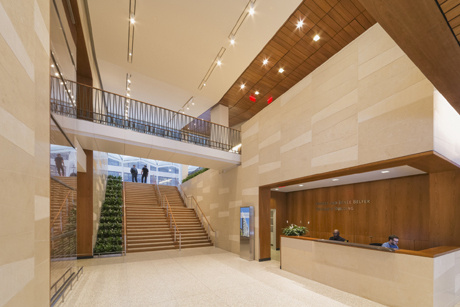
Feb
27
1:00pm - 2:00pm
Belfer Research Building
Friday, February 27, 2025
1pm-2pm
Belfer Research Building, Room 1401
or Zoom Details Below
Whole-Genome Sequencing of Metastatic Prostate Cancer
A case referred by Clara Hwang, MD, Henry Ford Health, Detroit, MI
Case presented by
Majd Al Assaad, MD
Research Fellow
Department of Pathology and Laboratory Medicine
Englander Institute for Precision Medicine
Weill Cornell Medicine
Discussion
Target-Enhanced-Whole-Genome Sequencing in Advanced Prostate Cancer: Insights from a Precision Oncology Program
* This activity has been approved for AMA PRA Category 1 Credit(s)™*
Zoom
Suzanne J. is inviting you to a scheduled Zoom meeting.
Topic: Precision Medicine Case Conference (Tumor Board)
Time: This is a recurring meeting Meet anytime
Join Zoom Meeting
https://weillcornell.zoom.us/j/91449509644
Meeting ID: 914 4950 9644
---
One tap mobile
+16469313860,,91449509644# US
+16465189805,,91449509644# US (New York)
---
Dial by your location
• +1 646 931 3860 US
• +1 646 518 9805 US (New York)
• +1 646 876 9923 US (New York)
• +1 312 626 6799 US (Chicago)
• +1 470 381 2552 US (Atlanta)
• +1 651 372 8299 US (Minnesota)
• +1 786 635 1003 US (Miami)
• +1 267 831 0333 US (Philadelphia)
• +1 301 715 8592 US (Washington DC)
• +1 602 753 0140 US (Phoenix)
• +1 669 219 2599 US (San Jose)
• +1 720 928 9299 US (Denver)
• +1 971 247 1195 US (Portland)
• +1 206 337 9723 US (Seattle)
• +1 213 338 8477 US (Los Angeles)
• +1 253 215 8782 US (Tacoma)
• +1 346 248 7799 US (Houston)
Meeting ID: 914 4950 9644
Find your local number: https://weillcornell.zoom.us/u/abVuWIdBS0
---
Join by SIP
• 91449509644@zoomcrc.com
---
Join by H.323
• 144.195.19.161 (US West)
• 206.247.11.121 (US East)
• 115.114.131.7 (India Mumbai)
• 115.114.115.7 (India Hyderabad)
• 159.124.15.191 (Amsterdam Netherlands)
• 159.124.47.249 (Germany)
• 159.124.104.213 (Australia Sydney)
• 159.124.74.212 (Australia Melbourne)
• 170.114.180.219 (Singapore)
• 64.211.144.160 (Brazil)
• 159.124.132.243 (Mexico)
• 159.124.168.213 (Canada Toronto)
• 159.124.196.25 (Canada Vancouver)
• 170.114.194.163 (Japan Tokyo)
• 147.124.100.25 (Japan Osaka)
Meeting ID: 914 4950 9644
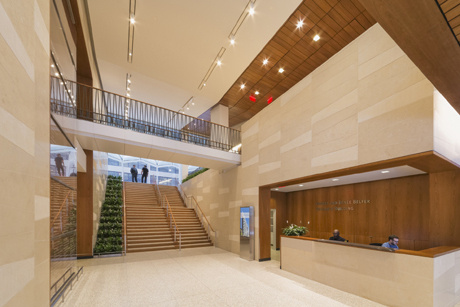
Feb
13
12:00pm - 1:00pm
EIPM Precision Medicine Seminar Series with Dr. Edwin K. Silverman


